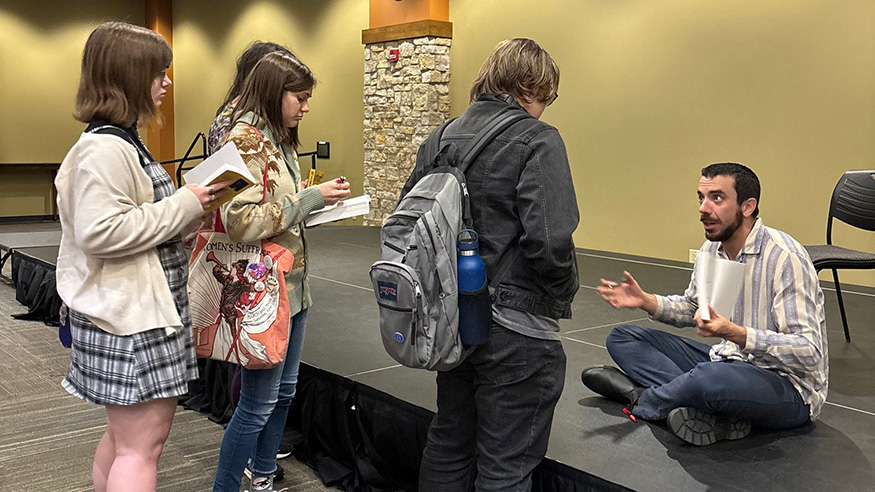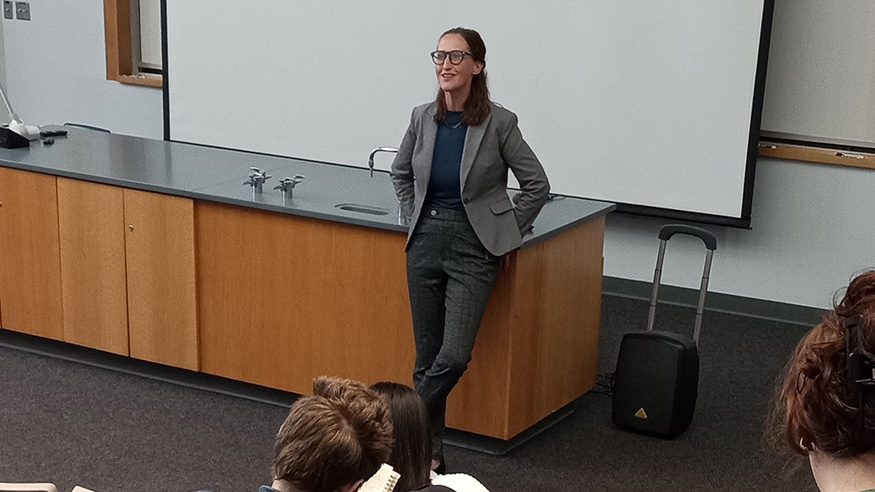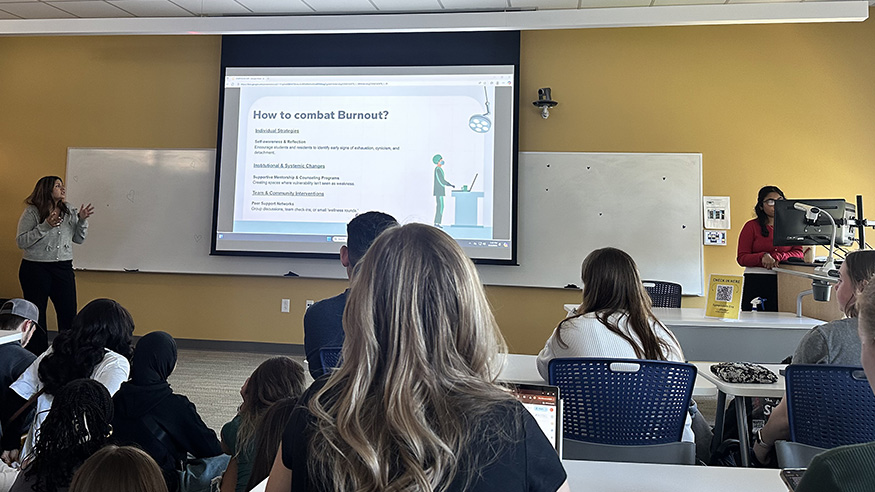Symposium Day 2025 expresses voice and vision
Voice is the power of expression. Through stories, songs, arguments and actions, we make our voices heard, individually and in community. Vision is the power of witness and imagination. It is what the eye beholds, but also what the heart calls into being. Voice and vision drive change. They help us confront injustice, realize new possibilities, and build communities rooted in creativity and truth-telling.
This year’s Symposium Day theme, Voice and Vision, invited projects that explored how we speak and see, literally and metaphorically, across all disciplines. Whether through science, art, literature, politics or community action, speakers and participants illuminated what it means to speak boldly and see clearly.
The complete list of session descriptions is available at Fall Symposium Day: Voice and Vision.
Keynote address: Kaveh Akbar, “The Word Dropped Like a Stone: Echoes of the Ancients”

Kaveh Akbar (right) speaking with students after his presentation
Poet and novelist Kaveh Akbar‘s keynote address was as remarkable for silence as for language.
Born in Iran, Akbar said his first sentence was to ask for aab, the Persian word for water. “I’ve always been a little thirsty, and enamored of the materiality of language.” He said as a child he learned Arabic so he could pray in Arabic, the language spoken by God, and hoped “it would thin the membrane between us.”
Demonstrating timelessness in the language of poetry, Akbar read aloud from poet Jane Hirshfield’s translation of Enheduanna, a high priestess from the ancient Sumerian city of Ur, living 43 centuries ago. Afterward, he asked, “Don’t you feel the tangible difference in the room? Now all of you will be indelibly connected by this.”
At a time when we are experiencing “a sense of the utter unprecedentedness,” Akbar said that when he reads Enheduanna, he feels “nothing but precedented.”
Akbar called our lives a “15-minute train ride between two infinities from which nobody can report.” But poets aren’t afraid to not understand, and to live with mystery. Poetry gave him a place to “put himself” during recovery from alcohol addiction (see his full-length book of poems, “Calling a Wolf a Wolf,” and chapbook, “Portrait of the Alcoholic”).
The mystery that runs through our lives was as timely for the ancients as it is for Taylor Swift, Akbar said. He quoted Hafiz, Sappho, Yeats, Szymborska and an ancient Mesoamerican midwife to a mother who died in childbirth — showing connections between all.
The last poem he read was by Kobayashi Issa (1763-1828, trans. by Robert Hass):
The man pulling radishes
Pointed the way
With a radish
After his talk, students lined up to ask Akbar questions, each receiving a copy of his debut novel, “Martyr!” — a New York Times bestseller and finalist for the National Book Award. Well after the plenary was over, he stayed longer to sign books and talk more with students.
Dr. Christine Jeske, "Racial Justice for the Long Haul: Cultivating Rugged Hope and Enduring Change"

Dr. Christine Jeske presenting
In her presentation, cultural anthropologist Dr. Christine Jeske drew on years of in-depth personal interviews with activists around the world to discuss how to sustain hope during challenging times.
She has studied people who have been committed to racial justice their entire lives, those who haven’t given up when others have. These individuals tend to have developed practices, relationships and spiritual resources to help sustain them.
An associate professor at Wheaton College, Dr. Jeske explored how one preserves hope and practices resilience, especially when media attention fades.
The hope she talks about is not simple optimism or a naive “everything will work out.” She acknowledges suffering, brokenness and systemic injustice. Her hope works through them. How one lives, works and participates in relationships is important, as well as how one learns and changes. These practices help make hope more than a feeling. They make it visible and more sustainable.
She offered the audience three aspects of hope that can help lead to sustaining justice work over time:
- Recognizing reality. Injustice is heavy and complicated. Be open to discomfort (yours and others’ discomfort) and challenge your understanding of justice. Life experiences teach hope in different ways. Be intentional when looking for inspiration.
- Living within the story of interrupting bad. Keep in mind both “what is” and “what could be.” Small acts are usually not small at all. Moments of hospitality or listening, acts of repair … this is where hope is felt and made visible.
- Responding to what you’ve received. Listen and learn when others give the gift of pointing out an injustice when it is not recognized by you and others.
Dr. Jeske ended her presentation with the idea that hope must become a part of a person for it to survive the long haul.
Isabel Joseph '28 and Israa Fyaz '28, "Burnout in Medicine: Understanding the Student and Resident Experience"

From the left, Isabel Joseph '28 and Israa Fyaz '28
Isabel Joseph '28, a biology major on the pre-optometry track, and Israa Fyaz '28, a biology and neuroscience double major, presented on burnout in the medical field. They gave an in-depth explanation of factors that contribute to burnout when pursuing a career in the medical field.
The reasons for burnout can be different depending on where you are in your medical journey. Joseph and Fyaz cited academic stress, financial burden, intense clinical rotations and pressure to succeed as contributing factors to burnout.
They also pointed out that burnout can lead to negative effects, like exhaustion, difficulty focusing, lack of compassion for patients, staff shortages or a decline in performance. The audience watched a video from a practicing doctor, who explained their experience with burnout.
"Burnout is a sign that the human side of medicine is disappearing and needs to be restored," the presenters said.
Joseph and Fyaz also examined a case study, which encouraged attendees to ask themselves what they would do if they were faced with a medical task but experiencing significant effects of burnout.
Joseph and Fyaz said that for students and residents, experiencing burnout is an early warning for help.
